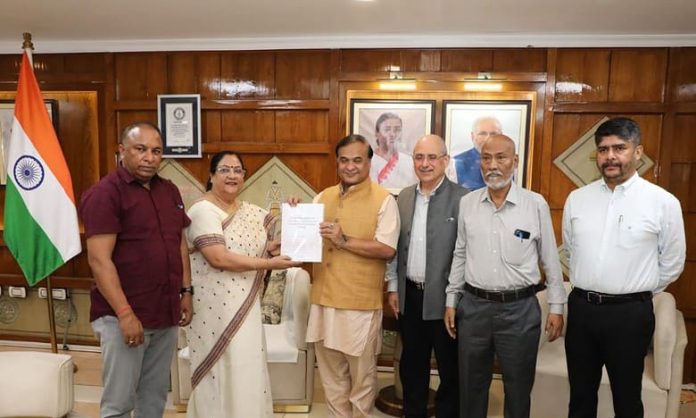Arshad Shaikh studies the recent announcement by the Government of Assam to seek public opinion on its proposed law to ban polygamy in the state. Assam is a BJP-ruled state and it appears that the party is trying its time-tested technique of consolidating the Hindu vote bank by antagonising the Muslim community, which construes the move as a direct attack on their religious identity through the tinkering of its constitutional guarantee to practise the Shari’ah in their Personal laws. There is also a legal aspect to it as the proposed law would require Presidential assent. What is the Islamic perspective regarding polygamy? Do Muslims outnumber other communities in its practice? The entire exercise exposes the misplaced priorities of the ruling party.
BJP leader and Chief Minister of Assam, Himanta Biswa Sarma, shared a public notice on 21 August on his Twitter (now known as X) handle, asking people to share their suggestions on a proposed law to ban polygamy in the State of Assam. The notice declares that the Government of Assam had established an Expert Committee to examine the legislative competence of the State Assembly in enacting a law prohibiting polygamy within the state.
Following thorough analysis, the Expert Committee presented its report to the Hon’ble Chief Minister, concluding that the State Legislature can enact a law prohibiting polygamy. The notice further emphasises that the Constitution of India allows the Union and states to make laws on specific subjects, like marriage, under Concurrent Legislation. It means both can pass laws on it. The Doctrine of Repugnancy (Article 254) states that if a state law contradicts a central law, the central law shall prevail unless the President of India approves the state law beforehand.
Articles 25 and 26 of the Constitution grant freedom of religion and worship, but these rights are limited by public order, morality, health, and laws for social welfare. Courts clarify that religious practices must be integral and constitute essential practice to receive their protection. Courts have ruled that having multiple wives is not an essential practice under Islam. Laws restricting wives align with “social welfare,” and do not violate Article 25. Thus, Assam can make a law to end polygamy.

Speaking exclusively to Radiance, the General Secretary of the All India United Democratic Front (AIUDF) and MLA from Jania, Barpeta, Dr Rafiqul Islam said, “It is possible that they may bring that bill (to ban polygamy) in the upcoming session of the Assembly. The Constitution of India protects the rights of all citizens, including the minorities. If any amendment is required then it is the job of Delhi (the Central government) not the state government.
“The Qur’ān does not mandate polygamy. It is an option that can be exercised after fulfilling the proviso of equal treatment. If somebody wants to go for another marriage because of a particular situation (maybe the first wife cannot conceive or has some chronic disease) and cannot fulfil his marital needs and he is confident of meeting the (Islamic) requirements then he may exercise the option of a second marriage. The state should not interfere in that decision.
“This proposed legislation is meant to tarnish Muslims. The allegation that only Muslims practising polygamy is false. There are so many who are living with other women (outside the fold of marriage). These off the record live-in relationships and the children that are borne of those relationships are illegal and cannot claim to any inheritance rights. Their lives are miserable. Some even do not know their real biological father. In Islam, the children born out of polygamous marriages enjoy equal rights. Therefore, this issue should be left alone.
“In case, some Muslims practice polygamy without giving the due rights to their spouses, whose number is minimal, then they should be educated and counselled.”

According to Supreme Court lawyer Nabeela Jamil, “The Constitution of India in particular and the Indian legal system in general, imbibe legal pluralism as a crucial tradition of India. Given the heterogeneity, the demography, diversity at large – the Constitutional framers in India naturally have been conscious of these realities (See Article 48, 25 (Explanation 1), 290-A, 371-A to 371-G, etc. of the Constitution of India, Also See Sarna Code).
“Personal laws are not a concession to the minorities in India. They have been and continue to be a leading reason for keeping the idea of India intact. Having said this, it is a misconstrued understanding that apart from personal laws, India imbibes a homogenous legal system. Further, any law or the proposal of the same must be viewed in the socio-political context and not in isolation.
“Assam, particularly in the recent years, has seen a sharp and apparent rise in the anti-Muslim politics. From the NRC pot kept boiling to this year starting with a massive crackdown on families (mostly Muslims) under POCSO in the garb of controlling child marriages – Muslims in Assam have been targeted, criminalised and further marginalised through different tactics. A proposed law to “ban polygamy” must be viewed in the same context – an attack on Muslim identity in the state of Assam.
“Coming to polygamy, this must be reiterated repeatedly that in India, polygamy is practised mostly among tribals. However, the selective targeting and projection of the Muslim community on the issue reeks of nothing but an anti-Muslim sentiment and propaganda.”
The Islamic view on polygamy
It is a common misconception that Muslim men are obligated to have multiple wives. However, the reality is quite the opposite. The Qur’ān is the sole religious scripture in the world with the directive to “marry only one”. In no other religious text does one find guidance for men to have just a single spouse.
Before the revelation of the Qur’ān, there existed no established cap on polygynous marriages, and historical accounts recount instances of men having numerous wives, even numbering in the hundreds. The Qur’ān permits a limited practice of polygyny, allowing a man to marry up to four women, provided he treats them equitably. This principle is articulated in Surah Nisa-verse 3, which states that a man may marry two, three, or four women, but if he fears he cannot treat them fairly, he should marry only one. Hence, polygyny is not a universal rule within Islam but rather an exception.
In countries like India, the male population surpasses the female due to the rampant prevalence of female foeticide and infanticide. Statistically speaking, such an unbalanced sex ratio is bound to lead to a situation where females will surpass males, wherein polygyny will have to be practised if all males and females are assumed to marry at some point of time in their lives.
In Western culture, it is common for a man to have mistresses or engage in multiple affairs outside of marriage. In such cases, the women involved are often seen as leading lives without honour or protection. Interestingly, this same society tends to frown upon a man having more than one wife. Undeniably, women in plural marriages maintain a respected and dignified status within the community, leading lives under protection.
Consequently, for a woman who is unable to find a husband, there are essentially two choices: to marry a married man or to face societal judgment. Islam takes a stance that prioritises honouring women by allowing the first option and discouraging the latter. While there are various other reasons behind Islam’s acceptance of limited polygyny, a primary motivation is to safeguard the modesty of women.
Messed up priorities
The economy of Assam is largely agricultural with nearly 70% of its people still dependent on farming and agriculture-related work for earning an income. The state ranks 17th in GDP and 28th in GDP per capita among all the states in India.
As per the NITI Aayog, Assam is ranked 26 of the 28 states in terms of performance across Sustainable Development Goals. Every year the state in inundated with floods causing massive loss of life and property. Despite these massive challenges, the political leadership is messing up its priorities. Instead of focusing on growth and development, it is engaged in futile attempts to change the personal laws of minorities in the fond hope that this minority bashing will fetch it votes from the majority community. It should heed the words of Audre Lorde – “It is not our differences that divide us. It is our inability to recognise, accept and celebrate those differences.”




